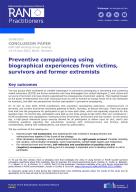Details
- Publication date
- 9 October 2023
- Author
- Directorate-General for Migration and Home Affairs
- Country
- Germany
- RAN Publications Topic
- Alternative and counter narratives
- Formers
- Victims of terrorism
Description
key groups often considered as credible messengers in preventive campaigning in preventing and countering violent extremism (P/CVE) are former extremists who have disengaged from radical ideologies and victims and survivors of terrorism who have directly experienced the consequences of extremist violence. This meeting focused on the power of testimonials from both victims/survivors as well as formers to change minds (of at risk individuals for example), and offer new perspectives via their participation in preventive campaigning.
On 13 and 14 June 2023, P/CVE practitioners with preventive campaigning experience, victims/survivors of terrorism, exit workers and former extremists gathered in Berlin, Germany, to discuss this topic. There was ample time built into the programme for participants to get to know each other, which was especially important for this sensitive topic. On the first day, participants were split up into three groups to talk within their own ‘constituency’: P/CVE practitioners and campaigners; victims/survivors of terrorism; and formers and exit workers. On the second day, a high-paced interactive group exercise allowed for all participants to deliver input for do’s, don’ts and remaining questions regarding four sub-themes: involving both victims/survivors and formers, ethical considerations, dealing with media/publicity, and advice for policymakers.
The key outcomes of this meeting are:
- Execute proper risk assessment, also assessing the risks involved in bringing formers and victims/survivors together if this is part of the strategy.
- When developing campaigns, work in partnerships to have the right people on board. Consider including exit workers, communication strategists, victim organisations, mental health experts and researchers.
- For victims/survivors and formers, self-reflection and consideration of possible risks and (negative) consequences of being part of a campaign is important prior to deciding whether or not to participate.
- The duty of care does not end with the end of a campaign. In aftercare after a campaign, try to mitigate repercussions of being involved in a campaign, be sensitive towards the needs and possibilities of a person and think beyond the campaign time.
- A joint campaign including both formers and victims/survivors can show a more complete story but is not always necessary or advisable.
- Do not instrumentalise victims/survivors or formers. Treat people from both groups humanely. Do not force victims/survivors or formers to tell their story in a way that is uncomfortable to them.
- Do not portray victims/survivors and formers as ‘superstars’ or ‘heroes’.
- Remaining questions that need further discussion are:
- Who decides if a former is ‘ready’ to be part of a campaign and if a victim/survivor is ready to share their story without the risk of self-harm? And how is it possible to ‘measure’ this?
- Should formers and victims receive financial compensation for their role to speak/participate in a campaign?
- Can participating in campaigns (either in the media or in an educational setting) help with the individual and/or the collective healing process?
The remainder of this paper will firstly cover the highlights of the discussions that were held during the different parts of the 2-day meeting. Secondly, the do’s, don’ts and remaining questions are presented. The paper concludes with suggestions for follow-up topics based on the outcomes of this meeting.

